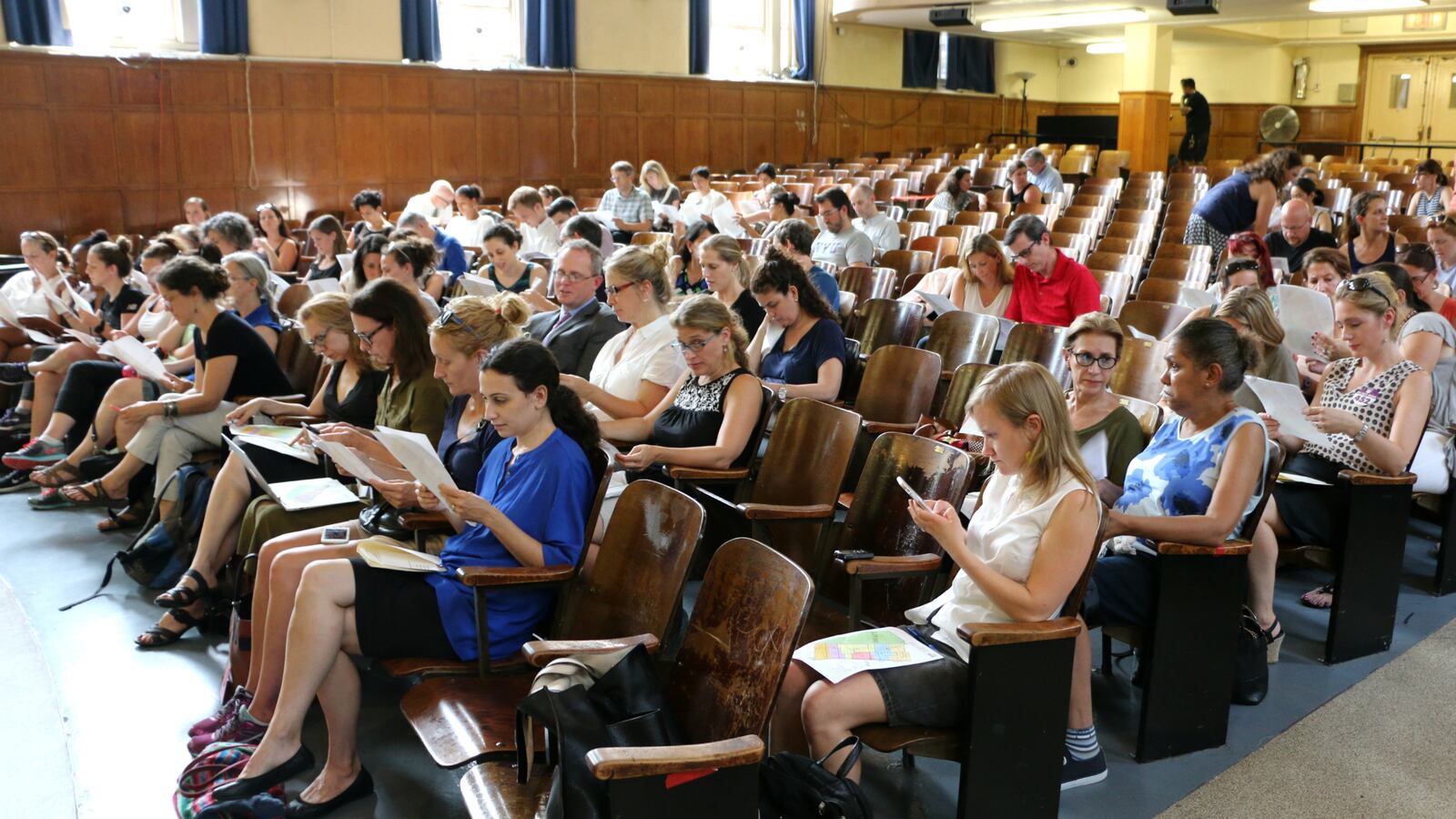A bitter rezoning battle on the Upper West Side doesn’t seem any closer to resolution after city education department planners released a new proposal on Wednesday.
Community Education Council members questioned why schools in Harlem haven’t been considered, while parents who would be zoned out of high-performing P.S. 199 continued to push back.
The dispute has highlighted inequities in District 3, where some schools serve mostly poor students and others have very few. City officials have said they are trying to address overcrowding and increase diversity through the rezoning, which has dragged on for more than a year now.
Council President Joe Fiordaliso lamented the nasty turn the debate has taken, saying parents have taken to criticizing each other, and even parents being “stalked.”
“That is shameful,” he said. “We are neighbors.”
The latest plan would keep high-achieving but jam-packed P.S. 452 in its current site, rather than moving it 16 blocks away to a building that faces a public housing complex. In a new move, the school’s zone would become smaller so it could accommodate students from outside, who would be admitted under a yet-to-be-determined policy that includes student diversity as a consideration.
Though some parents mounted a vocal campaign against moving P.S. 452, school staff and others support moving the school, which would free up much-needed space in their shared building.
“Early on, a lot of opposition to this was about the distance…The benefits of having our own building far outweigh that short-term issue,” said Hilda Blair, a parent at P.S. 452. “We will all have new friends with a new community. We have ties with our current families and we’ll keep those. I don’t think any of that is at risk by moving the school.”
Highlighting the delicate task facing planners, the new proposal keeps zone lines around P.S. 75 largely intact. The PTA there had raised concerns that redrawing their boundaries to include more higher-income families would threaten Title I funding, which is disbursed to schools with high student-poverty levels.
But the sticking point remains around P.S. 199, a sought-after school with some of the longest kindergarten waiting lists in the city.
Residents of Lincoln Towers and other nearby buildings have fought to remain in P.S. 199 and elected officials from the city and state have joined their cause. Sarah Turchin, DOE’s director of planning for Manhattan, said keeping Lincoln Towers and the other buildings in the P.S. 199 zone could “compromise our ability to promote diversity.”
“We did look at all of the feedback we received within the context of our larger goals: to alleviate overcrowding and promote diversity, which are goals we share with the CEC,” Turchin said.
The dissenting parents would be rezoned to P.S. 191, a school that serves more minority and low-income students and has much lower test scores.
“It’s very frustrating when you’re trying to do the best for your child…and it’s ripped from your grasp,” said Megan Arazi, a parent who would be zoned out of P.S. 199. “The alternative is not an appropriate replacement.”
The principal and parents at P.S. 191 have insisted their school is on the upswing and have repeatedly encouraged parents to come visit.
“There are a lot of misconceptions,” said P.S. 191 Principal Lauren Keville. “I think it’s really important to actually come and see, talk to our parents… about the great work that’s happening.”
Residents have questioned whether cutting their buildings from the P.S. 199 school zone would actually help with either overcrowding or integration, because new high-rise buildings would be zoned to P.S. 199 under the city’s plans. One man waved a public records request addressed to the education department for their data supporting their enrollment projections — a request he said has gone unanswered.
“Why did you not listen?” he asked city planners. “This process — these lines — make no sense.”
Audience members burst into applause when Councilmember Noah Gotbaum echoed the same concerns.
“There’s no transparency here,” he said.
DOE officials said they can’t release some data because of student privacy concerns, but that they will work to make other information available.
Meanwhile, some council members are pushing for more ambitious plans that would impact more of District 3. Councilmember Kimberly Watkins, chair of the zoning committee, pointed to under-enrolled schools in Harlem.
“We owe it to them to offer a solution,” she said.
District Superintendent Ilene Altschul said the city has started reaching out to schools in the northern end of the district. Turchin suggested the city could undertake a new rezoning process to address schools in that area.
The latest proposal is the third to be put on the table. A final zoning plan is expected in October, with a CEC vote in November.

